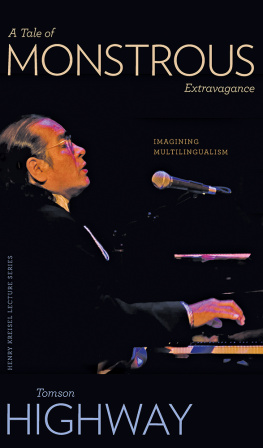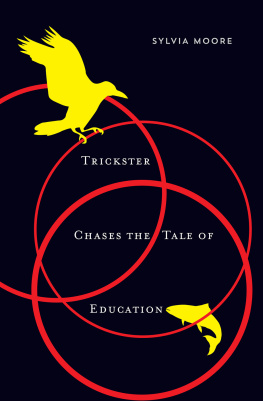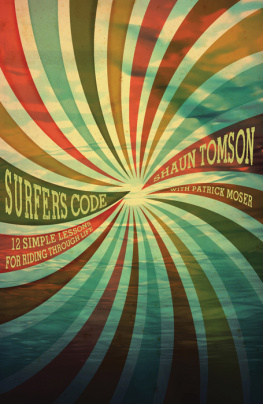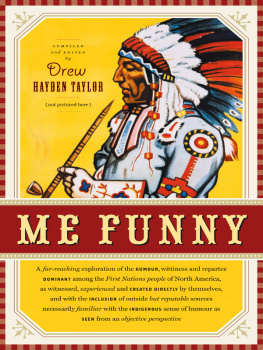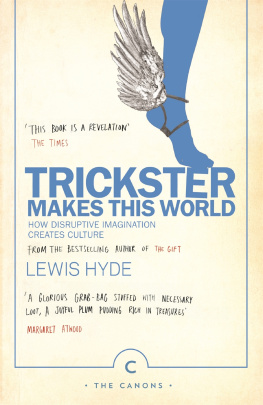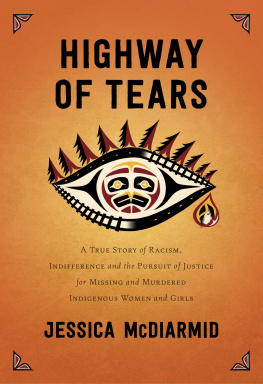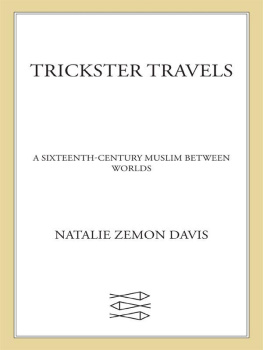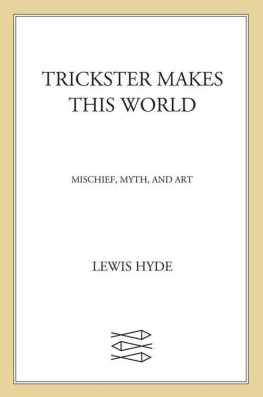
The straight line is godless and immoral.
Friedensreich Hundertwasser,
Austrian artist and visionary
The Power of the World always works in circles.
Black Elk, Oglala Lakota medicine man
One
On Language
Taansi, niwee-cheewaa-ganak, taansi. (Hello, my friends, hello.)
Nihee-thiwee-win, eeya-goo neetha nta-yamoo-win. (Cree, that is my language.) Eeya-goo aya-moowin ngaa-pachee-taan oota masin-a-eega-neek. (That is the language I will be using in this book.)
How, kaachi-moostaa-tinaa-wow igwa. Ootee waathow keeweet-nook neetha kaagee-neetaa-weegi-yaan. Kwayas kayaas eeya-gwaani-ma kaa-i-tamaan. Maw peeyak iskool igootee kee-ayow. Mawch igoo-speek. Igoochi keespin nigee-weeskoo-loowin, poogoo tasi-pweetee-aan. Poogoo tana-gata-wagwow ninoo-taawee-gaanak. Poogoo tana-gata-maan ntaski. Igwaani igoosi ngeetoo-teen. Ngee-sipwee-taan igoospeek keegach teepagoop poogoo kaagee-tawtaw-skeewin-eeyaan. Sawa-nook nigee-tootaan. Kwayas waathow sawa-nook. Oopaas-kooyaak keesi-theegaa-tao anima ooteenow itee kaageen-tay tagoo-sinee-yaan. Igoota kaagee-skooloo-wiyaan. Keegaam-taa-aat aski igootee kaagee-ayaa-aan. Maa-a taatoo-neepin nigee-geewaan tantay- weecha-a-magwow neetsaa-nak. Neepin, ispeek maawachi kaami-thathaw-stik saagay-higan igwa maawa-chi kaamaa-mithoo-geesigaak. (Now, I will tell you a story. I was born in the Far North. That was a long time ago. There was no school up there. Not back then. Thats why, if I wanted to go to school, I had to leave home. I had to leave my parents. I had to leave my land. So thats what I did. I left when I was almost seven. I went south. I went very far south. The Pas was the name of the town where I went to school. I lived there for nine years, though I went home for two months every summer to be with family: July and August, the best part of the year, when the ten thousand lakes that are our home are at their calmest, the days at their longest, the weather at its most balmy.)
Cree is a northern language, at least for Canadians who live right next to the U.S. border, which is most. So far north does the language live that most have never heard it, much less speak it. However, for the Dene (pronounced Day-nay) and the Inuit that is, for the peoples whose ancestral lands are the vast territories of Yukon, Northwest, and Nunavut Cree is southern, so far south that it might as well live on the beaches of Rio de Janeiro. Cree, that is to say, lives between the two extremes of north and south, as Canadian a concept as one can get. We speak here of the northern half of our countrys six largest provinces. A good third of the nation, one would like to say, if not for the fact that Nunavut alone is the same size as all of Western Europe.
In the early decades of the twentieth century, five young Cree adventurers from North Central Saskatchewan started making inroads into Canadas subarctic. They rowed boats made of timber that were built for transporting trade goods northward and furs back south for a British fur-trading enterprise called the Hudsons Bay Company. Navigating an incredibly complex and incredibly rich drainage system of lakes and rivers, they fell in love with what they saw, a land spectacular beyond all expectation. And they stayed. My dad, Joe Highway, then just a lad of eighteen years, was one of them. The fact that Cree-speaking Metis and half-breeds started trickling into this area throughout this same period provoked the decision. The original definition of the term Metis was a person who was half Cree and half French, as the French root of the term, moiti, means half. French fur traders, after all, were the very first Moony-ass (our name for Europeans, a charming word like folks or buddies) to arrive up there, thus passing on to us such family names as Dumas, Michele, and Merasty. A half-breed was a person who was half Cree and half English, Scottish, Irish, or even Orcadian someone from Scotlands Orkney Islands all strains of Moony-ass who arrived up there after the French. The term, however, is outdated; almost insulting, it is no longer used. To attest to such Anglo or part-Anglo ancestry, Cree families in Northern Manitoba today still bear such names as Cook (my mothers maiden name), McKay, and Flett, the last still the most common name on the Orkney Islands. That the women of marriageable age in this burgeoning community were fetching was no deterrent either. Refugees from a historic rebellion in Southern Manitoba named after its leader, Louis Riel, my mothers forebears formed part of this northward migration. My father decamped from Northern Saskatchewan to Northern Manitoba to wed my mother and stayed so that we, too like the Ojibway and the Mohawks of Ontario and the Blackfoot of Southern Alberta straddle a border, if only one that is provincial and not international.
This was how the Cree language arrived in the northwest corner of Manitoba, one prong from the southwest (Saskatchewan) and one from the southeast (Manitoba), on land that was situated so far north that it was no longer Cree territory but Dene. And thus it was that within one generation of uneasy coexistence between these peoples Dene, Cree, and Cree-speaking Metis many among them became bilingual. In Cree and Dene (but not French or English). My father was one. And it was only a matter of time before those aforementioned Cree adventurers and their progeny, my father among them though this time with a wife and the first two of what would be a final tally of one dozen children penetrated even farther north, thus encountering the true Arctic people: the Inuit. And learned their language. At least, my dad did. Which is how, when you add to the mix the pidgin English he had managed to absorb in his youthful dealings with the Hudsons Bay Company as a rower of York boats, those vessels that transported furs in relays from northwestern Manitoba to Hudsons Bay, my father, Joe Highway, came to speak four languages: Cree, Dene, Inuktitut the language of the Inuit and English, not one of which comes from the same linguistic family and so are as different one from the other as English is from southern Slovakian. In a country filled with people armed with doctorates in English literature, business administration, and quantum physics, and who speak but one language, Joe Highway, a man who never set foot in a single school for a single day, Cree caribou hunter and legendary world championship dogsled racer, spoke four.
Like all northern men of the time, my father had this way of leaving his wife and toddlers at home in the shelter of a cabin at our home base of Brochet (pronounced Bro-shay), a village of some eight hundred souls located some two hundred kilometres south of Nunavut, and wandering the vastness of the low subarctic and Arctic by himself for days, even weeks, at a stretch. It was the lifestyle they were hunters; tracking game was their bread and butter. Dad used to say that on windless days keeping in mind that the nearest human being lived ten thousand kilometres north of where he stood he could hear the earth breathe. Her lungs bogs, swamps rising and falling and rising and falling like a giant human heart. And humming, one extended note as pure as sound can be.
With no one else to talk to, he talked to his sled dogs. Cha for right, U (you) for left, and Marches for forward. Borrowed from the French verb in the single imperative, marches, pronounced like the English marsh and meaning walk, is a command that was later adjusted by anglophone dogsledders to the simpler though more prosaic mush. The language was basic, but the animals got it. The lead dog, in particular, who was picked from the litter and trained for the role from birth, would lead her teammates left, right, and forward, according to the call of the driver at the helm: my dad, Joe Highway. (Because of the smell of a certain organ found only on females, lead dogs were always female; thus, they have their penitents, their ardent followers.)
Next page

